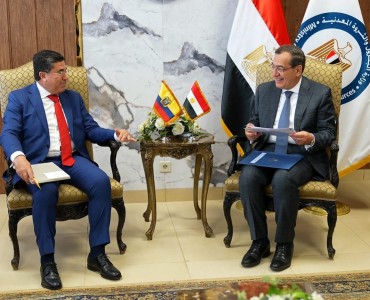The European Union is increasing pressure on Washington to include an energy chapter in a planned trans-Atlantic trade deal that would allow U.S. exports of natural gas and oil and reduce the bloc’s dependency on Russia.
In an interview with The Wall Street Journal, Maros Sefcovic, the EU’s energy chief, said that easing flows of liquefied natural gas and crude oil from the U.S. to the EU is one of the bloc’s goals for the trans-Atlantic trade and investment partnership, or TTIP, that is currently under negotiation. The U.S. has so far resisted an energy chapter in TTIP, but the shale-gas boom in the U.S. and the EU’s trouble with Russia have pushed the issue into focus.
“We believe that the energy chapter in TTIP…could make a quite important contribution to the mutually beneficial trade exchange, but also to the energy security of the EU,” Mr. Sefcovic said.
Fossil-fuel exports from the U.S. have been restricted for decades. Yet growing internal production of oil and gas has eased some of Washington’s concerns over energy independence and the Energy Information Administration believes the U.S. will become a net gas exporter in 2017.
In recent years, the Energy Department has granted long-term gas-export licenses to six U.S. gas projects, which will eventually be able to sell 8.61 billion cubic feet (240 million cubic meters) of gas a day. At the same time, the U.S. oil industry is lobbying to lift the ban on oil exports, hoping that new markets would boost prices.
“We are the biggest market in the world; we are the biggest energy importer in the world. So I think we are a quite important destination for any energy exporter,” Mr. Sefcovic said.
Trevor Kincaid, a spokesman for the U.
S. trade representative, said the U.S. hadn’t taken a final decision on whether to include an energy chapter into TTIP: “The United States has not decided on the threshold issue of whether or not there should be a separate chapter, or whether there should be unique provisions addressing energy and raw materials, or whether general rules that cover all sectors should apply.”
A 48-year-old Slovak diplomat, Mr. Sefcovic heads the EU’s push to create an “energy union” among its 28 member states. Apart from seeking out alternative suppliers to Russia, which currently provides almost one-third of the EU’s gas, that means breaking down long-standing barriers between the EU’s national energy markets.
On Monday, Mr. Sefcovic will launch his energy union roadshow, which will take him to 18 EU member states before the end of the year.
By the summer, the European Commission, the EU’s executive arm, will unveil plans to overhaul the bloc’s electricity market, including new cross-border grid connections called “interconnectors” that could help smooth out the highs and lows of renewable energy production and lower prices for consumers.
“We need swifter action from the member states, where very often, especially if it comes to interconnectors, it’s not always easy to get two or three countries to move at the same time,” Mr. Sefcovic said. “This should be one area where agencies for cooperation of national regulators could play a much stronger role to overcome national differences.”
The Agency for the Cooperation of Energy Regulators was created in 2009, as part of an earlier energy overhaul. But it can only issue nonbinding opinions and has so far failed to break resistance from national utilities and network operators to competition from abroad.
Mr. Sefcovic said he hasn’t decided what new powers could be given to ACER and how to improve cooperation among network operators—but that something will be done. “Everybody would be happy if the process would be smoother and faster when it comes to these cross-border elements of the energy union,” he said.
Source: Wall Street Journal












